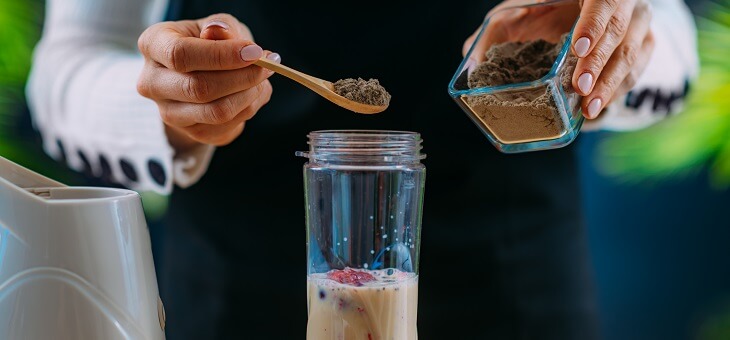You may have wandered down the aisles of your local Chemist Warehouse and seen row upon row of shelves full of tins of protein powder. If you’re over 50 and perhaps no longer into gyms and bodybuilding, you might also be tempted to ignore them all and move on quickly to the next aisle as you search for the item you came to purchase.
But should you stop and think before moving on? How important is protein to us as we get older? Do we get enough? And if we don’t, are protein powders the answer?
The answer to the first question is ‘very important’. While you will often see protein supplements marketed and displayed under the umbrella of ‘sports nutrition’, the truth is that protein comes under the more general umbrella of ‘nutrition’, regardless of whether or not you are an active participant in a sport.
Read: Wide variety of proteins protects heart, research finds
For older adults, protein is an important ‘macronutrient’. (In simple terms, macronutrients are those nutrients that the body needs in large amounts, and micronutrients are those nutrients that the body needs in smaller amounts.)
As you age, the average human begins to lose muscle mass. This process can start in your 30s or 40s, and generally accelerates once you cross over into your 60s. Age-related, involuntary loss of skeletal muscle mass and strength is known as sarcopenia.
Although sarcopenia is a natural part of the ageing process, it can lead to a number of health issues, and preventing it – or at least slowing it – can alleviate many of those issues.
Among the conditions that can result from sarcopenia are an increase in the risk of falls, fractures and physical disabilities, and an increased likelihood of insulin resistance, which is a precursor to Type 2 diabetes.
Read: Foods with more protein than eggs
Protein is one of the keys to slowing and/or minimising the loss of muscle mass. But before you head back to the sports nutrition aisle, it’s important to note that a healthy diet is more than likely to deliver your protein requirements.
While it is certainly true that older people are prone to muscle mass loss, it is interesting to note that the Australian government’s National Medical Research Council recommends the same daily protein intake for those aged 19 or 69. An increase is recommended once you cross the 70-year mark.
So, which foods will provide you with your daily protein needs? If you are not vegetarian or vegan, red meat can go a long way towards meeting your requirements, although no more than three meals of red meat per week are advised. Poultry and seafood are also sources of protein, as are eggs and dairy foods such as milk, cheese and yoghurt.
Read: Supercharge your diet with rye
Plant-based proteins can be obtained through legumes (such as beans, chickpeas, lentils, split peas and soybeans), which can also provide other nutrients that can lower cholesterol. Tofu is high in protein and is a good substitute for meat or poultry.
If you are under 70, a diet that includes regular serves of these foods is likely to provide you with all the protein you need (for men aged 70 and under, that figure is 0.84 grams per kilogram of weight daily, and for women aged 70 and under, 0.75g/kg), meaning that further protein through supplements such a whey powder sold through chemists are unnecessary.
There is no recommended upper limit of protein intake, but given the cost of protein powders (about $30 for two to four weeks’ worth, depending on the product) your best bet for getting all the protein you need is a good, healthy diet.
If you enjoy our content, don’t keep it to yourself. Share our free eNews with your friends and encourage them to sign up.
Disclaimer: This article contains general information about health issues and is not advice. For health advice, consult your medical practitioner.

